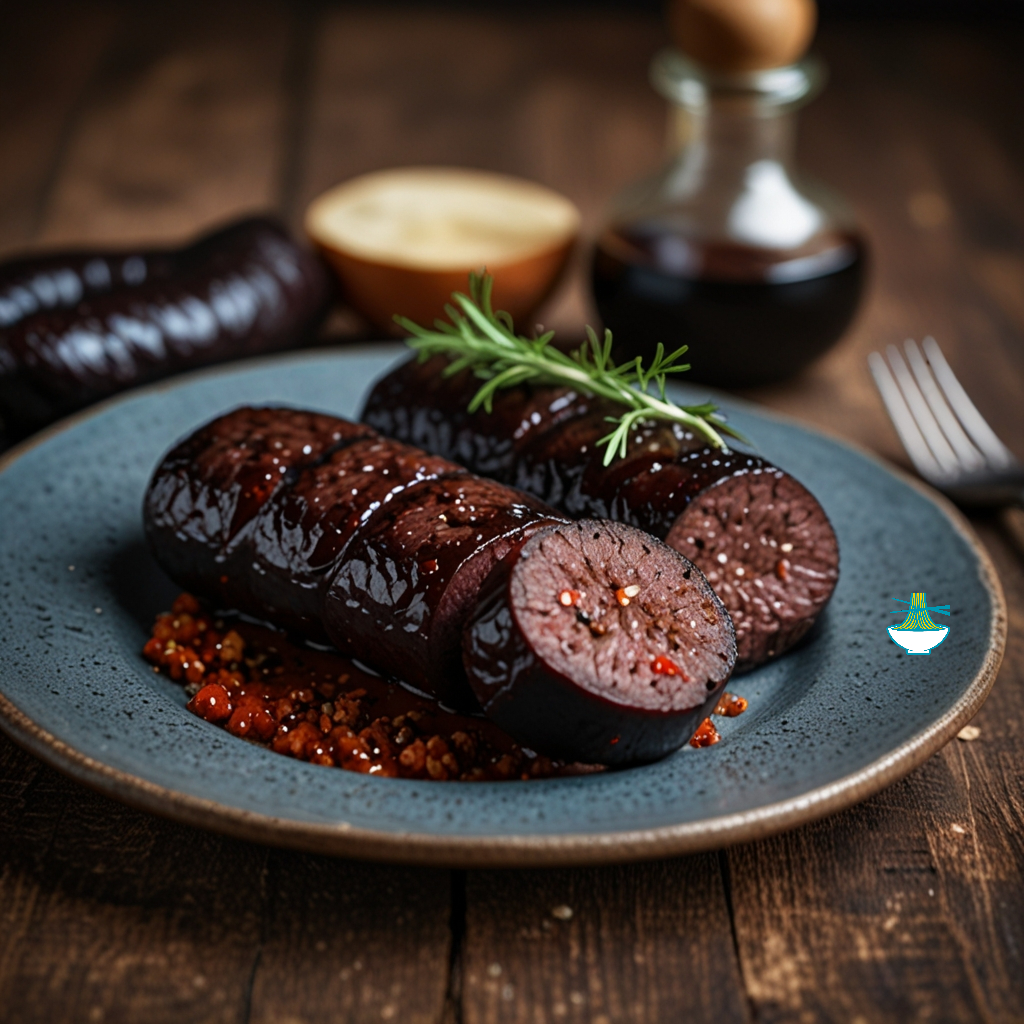Morcilla, a savory delight with a rich history, is a blood sausage made from a blend of pork blood, rice, onions, and spices. Originating from Spain, this delicacy has roots dating back centuries, cherished for its hearty flavors and versatility. Traditionally grilled to perfection, Morcilla offers a unique culinary experience, combining the earthy essence of blood with the fragrant notes of spices and the subtle texture of rice. Its enduring popularity spans cultures, making it a beloved dish enjoyed worldwide.
Ingredients:
- Pork blood
- Rice
- Onions
- Spices
Method of Preparation:
1. Cook rice until tender.
2. Mix cooked rice with pork blood, finely chopped onions, and desired spices.
3. Stuff the mixture into sausage casings or shape into patties.
4. Grill over medium heat until cooked through and nicely browned on the outside.
5. Serve hot and enjoy the rich flavors of this traditional delicacy.
Nutrition Value:
1.Pork Blood:
- Calories: Approximately 90 calories per 100 grams.
- Carbohydrates: Negligible.
- Protein: Rich source of protein, approximately 18 grams per 100 grams.
- Fat: Low fat content, approximately 2 grams per 100 grams.
- Sodium: Moderate sodium content, approximately 60 milligrams per 100 grams.
- Cholesterol: High cholesterol content, approximately 375 milligrams per 100 grams.
- Vitamins: Rich in iron and B vitamins, especially vitamin B12.
- Minerals: High in iron, zinc, and phosphorus.
- Nutritional Benefit: Pork blood is a good source of protein and iron, vital for energy production and oxygen transport in the body. It also contains B vitamins essential for metabolism and nervous system function.
2.Rice:
- Calories: Approximately 130 calories per 100 grams.
- Carbohydrates: High carbohydrate content, primarily starch, approximately 28 grams per 100 grams.
- Protein: Moderate protein content, approximately 2.7 grams per 100 grams.
- Fat: Low fat content, approximately 0.3 grams per 100 grams.
- Sodium: Low sodium content, approximately 1 milligram per 100 grams.
- Cholesterol: Cholesterol-free.
- Vitamins: Contains B vitamins, especially niacin and thiamine.
- Minerals: Rich in manganese, magnesium, and phosphorus.
- Nutritional Benefit: Rice is a staple food providing energy due to its high carbohydrate content. It also contains some essential nutrients like B vitamins and minerals, supporting overall health and metabolism.
3.Onions:
- Calories: Approximately 40 calories per 100 grams.
- Carbohydrates: Moderate carbohydrate content, approximately 9 grams per 100 grams.
- Protein: Low protein content, approximately 1.1 grams per 100 grams.
- Fat: Low fat content, approximately 0.1 grams per 100 grams.
- Sodium: Low sodium content, approximately 4 milligrams per 100 grams.
- Cholesterol: Cholesterol-free.
- Vitamins: Rich in vitamin C, vitamin B6, and folate.
- Minerals: Contains potassium, manganese, and phosphorus.
- Nutritional Benefit: Onions provide antioxidants like quercetin and sulfur compounds, offering anti-inflammatory and immune-boosting properties. They also supply essential vitamins and minerals necessary for various bodily functions.
4.Spices (Generic, e.g., Paprika, Cumin, etc.):
- Nutritional values vary based on the specific spice used.
- Calories: Typically low in calories.
- Carbohydrates: Negligible.
- Protein: Negligible.
- Fat: Negligible.
- Sodium: Varies based on the spice.
- Cholesterol: Cholesterol-free.
- Vitamins and Minerals: Varies based on the spice; some spices may contain small amounts of certain vitamins and minerals.
- Nutritional Benefit: Spices add flavor and aroma to dishes without significantly contributing to caloric intake. Additionally, many spices contain bioactive compounds with potential health benefits, such as anti-inflammatory and antioxidant properties.


Comments